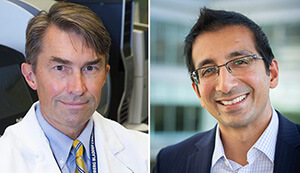McConkey, Gupta named HCRN Correlative Sciences co-chairs

David J. McConkey, PhD (pictured left), professor of urology and oncology at The Johns Hopkins University School of Medicine, and Gaorav P. Gupta, MD, PhD, assistant professor of radiation oncology, biochemistry and biophysics at the University of North Carolina School of Medicine, were recently appointed as co-chairs of Hoosier Cancer Research Network’s Correlative Sciences Clinical Trial Working Group. The group includes investigators from several HCRN member institutions who advise investigators on correlative research objectives for HCRN studies that are in development.
Dr. Gupta, a radiation oncologist specializing in breast cancer at UNC Lineberger Comprehensive Cancer Center, received his MD, PhD, from the Tri-Institutional MD-PhD Program offered by Weill Cornell Medicine, The Rockefeller University, and Memorial Sloan Kettering Cancer Center. He completed his residency training in radiation oncology at Memorial Sloan Kettering Cancer Center, where he served as chief resident his during his final year. His expertise in breast cancer began at Sloan Kettering Institute, where he studied the mechanisms of tissue-specific metastasis in breast cancer and the critical role of the DNA damage sensor protein Mre11 in breast cancer prevention.
Dr. Gupta’s UNC Lineberger lab studies the interaction between genome integrity pathways and breast cancer initiation, progression, and response to therapy. In recent years, his lab discovered an “addiction” to DNA polymerase theta in breast cancers that harbor mutations in more than 100 varied DNA repair genes, including BRCA1 and 2, and they developed a CRISPR-enhanced model for triple-negative breast cancer to identify molecular vulnerabilities of MRe11-deficient breast cancers that could be therapeutically exploited.
“I’m very excited to work with Hoosier Cancer Research Network and look forward to enhancing the scientific footprint of the studies investigators pursue,” Dr. Gupta said. “I think it’s an exciting time for clinical oncology and I’m very thankful to be a part of helping make these trials as cutting edge as they can be.”
Dr. McConkey received his doctoral degree from Karolinska Institutet in Stockholm, Sweden, and completed his fellowship at Dana-Farber Cancer Institute, where he studied immunobiology of T-cell selection. Following his fellowship, he worked as a scientist at MD Anderson Cancer Center for 23 years in the Department of Cancer Biology, where he led two National Cancer Institute SPORE (Specialized Programs of Research Excellence) programs, including one for pancreatic cancer and bladder cancer.
In 2016, Dr. McConkey moved to Johns Hopkins, where he currently serves as the first director of the Johns Hopkins Greenberg Bladder Cancer Institute. His research interests are in genitourinary cancers, including predictive biomarkers, DNA repair genes, and drug resistance. He currently serves as chair of translational medicine for SWOG Cancer Research Network’s GU Committee and is a sitting member on the NCI’s National Clinical Trials Network Core Correlative Sciences Committee.
Both Drs. McConkey and Gupta said they would like the HCRN Correlative Sciences group and collaborating investigators to take a comprehensive approach to study design as it relates to correlative research – while keeping the hypothesis top of mind.
“I think the role of these working groups is to make sure we’re considering all of the different aspects to get the most out of these trials that are often a huge undertaking to get off the ground, complete, and analyze,” Dr. Gupta said. “We want to encourage clinicians to follow the scientific process and make sure that the hypothesis is adequately tested, so that we can learn something from the study, even if it doesn’t end up achieving the pre-defined clinical endpoint.”
Dr. McConkey agreed and emphasized the importance of keeping up with emerging technologies that support correlative research.
“Technology that’s available to measure materials is evolving so quickly, that we want to make sure we collect the right samples in the right way,” he said. “Part of our job is to anticipate what we want to have in the bank when we do these measurements. To do that, on top of testing the hypothesis, we have to stay on top of the technologies, and make sure that we understand the standards for storing and collecting the tissue.”
Along with keeping up with technologies, Drs. McConkey and Gupta aim to build a sense of community within the Correlative Sciences group and with fellow HCRN collaborators.
“Getting to know the people that are regular contributors will make our group stronger,” Dr. Gupta said. “That will help us define strengths within our working group, such as, for example, knowing which researchers do a lot of single-cell, targeted RNA sequencing, or bioinformatics analysis, and we can then vet things at different stages.”
Dr. McConkey said he’s excited about what the future holds in translational science.
“We’re in an exciting time when scientific discoveries can actually be made first in patients, because it’s feasible,” Dr. McConkey said. “I think discovery should start with patients, and then move into pre-clinical models as we understand the mechanism.”
He said he is excited about the current and past portfolio of studies HCRN has conducted and looks forward to the potential impact they can generate.
“HCRN fits a niche that can’t be filled by other groups,” Dr. McConkey said. “It’s very nimble, creative, and effective. HCRN has created a lot of great trails, and I’m happy to be serving here.”
About Hoosier Cancer Research Network:
Hoosier Cancer Research Network (formerly known as Hoosier Oncology Group) conducts innovative cancer research in collaboration with academic and community physicians and scientists across the United States. The organization provides comprehensive clinical trial management and support, from conception through publication. Created in 1984 as a program of the Walther Cancer Institute, Hoosier Cancer Research Network became an independent nonprofit clinical research organization in 2007. Since its founding, Hoosier Cancer Research Network has conducted more than 230 trials in a variety of cancer types and supportive care, resulting in more than 350 publications. More than 9,000 subjects have participated in Hoosier Cancer Research Network clinical trials.

Facebook
Hoosier Cancer Research Network on Facebook
Linked In
You Tube
Twitter